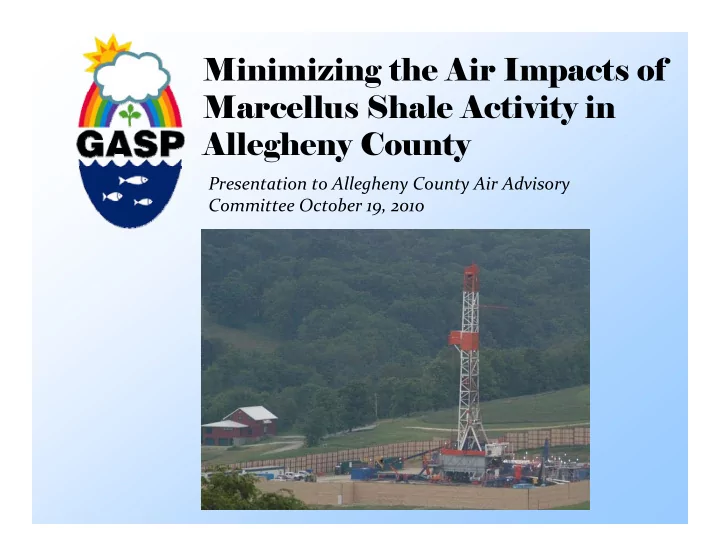

Minimizing the Air Impacts of Marcellus Shale Activity in Allegheny County Presentation to Allegheny County Air Advisory Committee October 19, 2010
What Pollutants are Emitted During Natural Gas Drilling, Extraction, Processing, and Transmission? 1. Methane 2. Air Toxics • BTEX Compounds: benzene, toluene, ethylbenzene, xylenes • hydrogen sulfide 3. Criteria Pollutants • Volatile Organic Compounds (VOCs) • Nitrogen Oxides (NOx) • Carbon Monoxide (CO)
What are the emissions sources? Numerous Sources. Among the most significant are: 1. Compressor Engines • fugitives • exhaust 2. Condensate Tanks • venting 3. Production/Transmission Fugitive Emissions 4. Gas Processing • dehydrators 5. Well Completions
What Pollutants are Emitted? 1. Methane • primary constituent of natural gas • potent greenhouse gas (21 times more powerful than CO 2 ) • explosive • oil and gas sector responsible for 18% of methane emissions worldwide
What Pollutants are Emitted? 2. Air Toxics • benzene, toluene, ethylbenzene, xylenes • benzene is a known human carcinogen • neurotoxic/reproductive/developmental effects • hydrogen sulfide • eye nose throat irritation • brain damage, death at high concentrations • frequently elevated near natural gas operations • TCEQ Study Aug.-Nov 2009 detected elevated levels of air toxics at multiple monitor locations near natural gas facilities. Benzene concentrations in excess of Texas health standards were detected at 21 out of 94 locations • DISH, TX study selected 7 monitoring locations near natural gas facilities. 5 locations air toxics concentrations exceeded short term ESLs.
What Pollutants are Emitted? 3. Ozone and PM precursors: • Volatile Organic Compounds • broad class of high vapor pressure organics • some carcinogenic • eye & respiratory tract irritation, headaches, dizziness • Nitrogen Oxides • acid rain • respiratory inflammation, exacerbates asthma • Methane • Carbon Monoxide
What are the emissions sources? 1. Compressor Engines • fugitives • exhaust 1200 hp compressor: NOx – 16 TPY CO – 18 TPY VOCs – 3 TPY HAPs – 0.5 TPY
Emissions Sources in Marcellus Shale Operations 2. Condensate Tanks a 400 bbl tank emits ~ 2 TPY VOCs
What are the emissions sources? 3. Production/Transmission Fugitive Emissions • leaking pipes, valves, flanges 4. Gas Processing • dehydrators 5. Well Completions
Amnon Bar-Ilan et. al. A Comprehensive Oil and Gas Emissions Inventory for the Denver-Julesburg Basin in Colorado (May 2008), available at : http://www.epa.gov/ttn/chief/conference/ei17/session2/amnon.pdf
Amnon Bar-Ilan et. al. A Comprehensive Oil and Gas Emissions Inventory for the Denver-Julesburg Basin in Colorado (May 2008), available at : http://www.epa.gov/ttn/chief/conference/ei17/session2/amnon.pdf
Al Armendariz, Emissions from Natural Gas Production in the Barnett Shale Area and Opportunities for Cost-Effective Improvements (Jan. 26, 2009), available at: http://www.edf.org/documents/9235_Barnett_Shale_Report.pdf
Limitations of Existing Laws Many Sources are exempted from Installation & Operating Permit Requirements • Allegheny County Article XXI incorporates PADEP’s Air Quality Permit Exemption List § 2102.04.a.5.L • PADEP list “Category 38” exempts all oil and gas equipment except: • compressors over 100 HP • major sources • In July PADEP requested comments on narrowed Category 38 exemptions, establishing emission limits/emission rates. Yet to go into effect • No need to submit an RFD or provide notice of intent to install emission unit to air permitting authority
Limitations of Existing Laws • No notice to Air Permitting Authority — ► No means for permitting authority to verify source meets exemption requirements • meeting emission rates? • emission limits? • employing required control measures? • under major source threshold?
Limitations of Existing Laws • No permit — ► No emissions reporting requirements • 2010 University of Texas air monitoring suggests TCEQ Ozone Attainment modeling underpredicted NOx by 20%
The Marcellus Shale Play is Perfectly Situated to Worsen Existing Ozone and PM Nonattainment in the Midatlantic and Northeast United States (including Allegheny County) Nonattainment Areas Shale Plays
The Oil and Gas Sectors’ Contribution to Ambient NOx and VOC can be Enormous Consider other areas where drilling is common: • A 2009 Southern Methodist University Study concluded that in the 5-county Dallas-Fort Worth area annual NOx and VOC emissions from the oil and gas sector exceed emissions from all motor vehicles. • A 2008 analysis by the Colorado Department of Public Health and Environment concluded that VOC and NOx emissions from Colorado’s oil and gas operations exceed motor vehicle emissions for the entire state. • In 2009 several years of elevated ozone readings (including elevated wintertime readings) lead Wyoming to request its first ever nonattainment designation. Wyoming DEQ states nonattainment “is primarily due to local emissions from oil and gas (O&G) development activities.”
What can Allegheny County Do? 1. Require RFD submittal for all stationary emission units associated with natural gas operations • RFD includes process description, emission units list, potential to emit • not as onerous for source operator as a full permit application, most information can be obtained from vendor spec sheets, AP-42 • provides Air Program with knowledge of emission units on site without having to perform an inspection • allows Air Program to determine if exemption criteria are satisfied: • is source major? • are emission limits/rates, pollution control requirements met? • provides better estimate of county emissions for emissions inventory
What can Allegheny County Do? 2. Require Additional, Cost-Effective Control Measures: Control Measure Up Front Cost Payback Period green completions $1000-10,000 1 1 year 1 electric compressors ~$100,000 less per cost neutral 2 compressor 2 vapor recovery units on $60,000 2 <1 year 2 condensate tanks Replace high-bleed <$1000 1 <1 year 1 pneumatic valves with mechanical valves varies, 1, 2 Gas STAR leak detection program, <$500 1, 2 ultrasonic leak detection participant reported payback in <1 year 1 1. EPA Gas STAR program, http://www.epa.gov/gasstar/tools/recommended.html 2. Armendariz Report (2009), http://www.edf.org/documents/9235_Barnett_Shale_Report.pdf
Recommend
More recommend